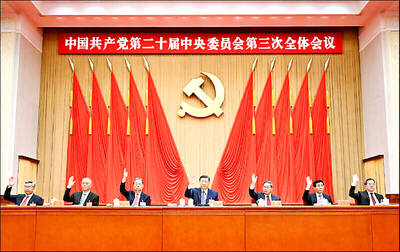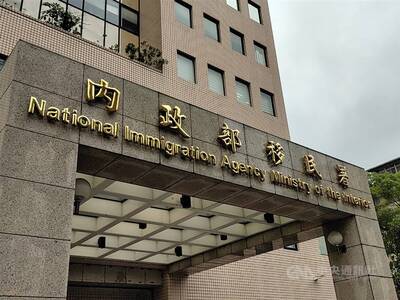The Chinese Nationalist Party (KMT) will postpone major staff cuts until after December's legislative elections, KMT Chairman Lien Chan (
"We will take care of this issue in phases," Lien said. "We will reconsider it ... Particularly in view of the approaching legislative elections, there would be an impact if we were to lay off all of the party's workers at this time."
Lien was responding to concerns raised by grassroots KMT workers after word got out that the KMT was planning to slash its workforce by the end of next month.
On Thursday the KMT's reform task force decided to recommend to the party that it lay off all 1,700 of its staff after settling salaries for this year. It was suggested that the party then rehire a maximum of 500 personnel according to need.
KMT Vice Chairman Wu Poh-hsiung (
The task force will forward its recommendations to the KMT's weekly Central Standing Committee meeting this Wednesday for final approval.
The KMT employs around 1,700 people, a workforce almost 10 times greater than that of the Democratic Progressive Party (DPP).
The union representing KMT staff yesterday expressed regret over the task force's recommended downsizing plan.
"Although we disapprove of the downsizing plan, what alternative is there for us?" KMT union boss Liu Chien-sung (
Liu criticized the task force for its proposal to rehire "good" workers after laying off personnel en masse.
"Whoever came up with the idea of `rehiring the good ones' hasn't got a brain in his head," Liu said.
"What does it mean when you say `good ones'? What do you then call the other 1,200 people who don't get rehired?" he asked.
"And once again, we have had to learn about all of this from media reports and not from the party itself," Liu said.
Comments critical of the party were left by angry KMT staff on the Web site of the union, with one saying that "the party's authorities should stop pushing party workers around."
Other comments made note of how soon they would be laid off, and asked why they shouldn't stop helping the party in its legislative campaign work.
Responding to an apparent lack of staff interest in the December campaign, Liu dismissed the comments as "merely the emotional words of angry people."

TECH SECTOR: Nvidia Corp also announced its intent to build an overseas headquarters in Taiwan, with Taipei and New Taipei City each attempting to woo the US chipmaker The US-based Super Micro Computer Inc and Taiwan’s Guo Rui on Wednesday announced a joint venture to build a computation center powered only by renewable energy. After meeting with Supermicro founder Charles Liang (梁見後) and Guo Rui chairman Lin Po-wen (林博文), Premier Cho Jung-tai (卓榮泰) instructed a cross-ministry panel to be established to help promote the government’s green energy policies and facilitate efforts to obtain land for the generation of green power, Executive Yuan spokesperson Michelle Lee (李慧芝) said. Cho thanked Liang for his company’s support of the government’s 2019 Action Plan for Welcoming Overseas Taiwanese Businesses to Return to Invest in

The unification of China and Taiwan is “non-negotiable,” China’s Taiwan Affairs Office (TAO) said yesterday in response to an article by a Chinese academic suggesting that Beijing would not set a timetable for the annexation of Taiwan in the next four years. Chinese international studies researcher Yan Xuetong (閻學通) at Beijing’s Tsinghua University wrote in an article published last week in Foreign Affairs that China’s focus for the next four years would be revitalizing the economy, not preparing a timetable to invade Taiwan. The TAO said that was only the personal opinion of an academic. The Chinese Communist Party has since 1949 committed

China is likely to focus on its economy over the next four years and not set a timetable for attempting to annex Taiwan, a researcher at Beijing’s Tsinghua University wrote in an article published in Foreign Affairs magazine on Friday. In the article titled “Why China isn’t scared of Trump: US-Chinese tensions may rise, but his isolationism will help Beijing,” Chinese international studies researcher Yan Xuetong (閻學通) wrote that the US and China are unlikely to go to war over Taiwan in the next four years under US president-elect Donald Trump. While economic and military tensions between the US and China would

The National Immigration Agency (NIA) said Thursday it had caught 124 people attempting to use forged documents to visit Taiwan since allowing Chinese nationals based overseas to apply for entry permits in September last year. The NIA’s revelation comes after unnamed immigration officials and travel agency workers cited in a CNA report Wednesday said that Chinese entry permit applicants had submitted forged documents showing they were students in Malaysia. After closing its borders to Chinese tourists on Jan. 22, 2020 amid the COVID-19 pandemic, Taiwan began allowing those living or studying outside of China to enter from a third country on Sept.